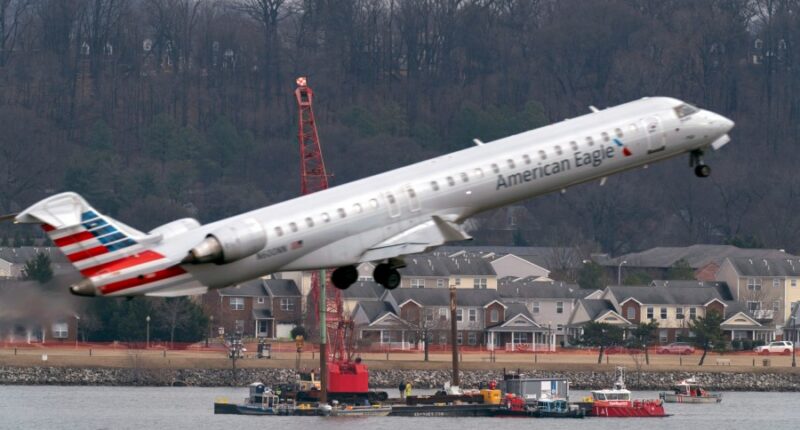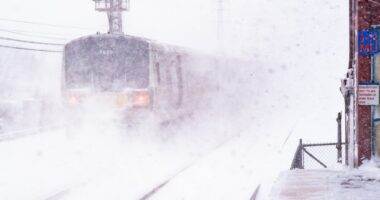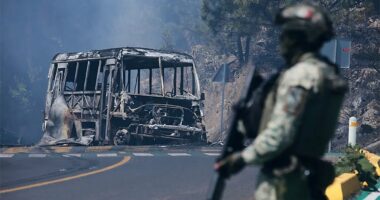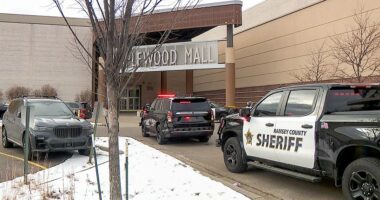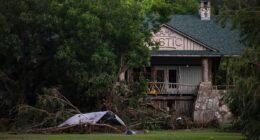Share this @internewscast.com

Commencing on Wednesday, a three-day series of investigative hearings will delve into the fatal midair collision over Washington in January, aiming to shed light on the causes behind the tragic crash between a passenger plane and an Army helicopter that claimed 67 lives.
The National Transportation Safety Board is set to interrogate witnesses and investigators regarding the potential influence of the Federal Aviation Administration and its air traffic controllers, along with the Army, on this horrific incident, recognized as the nation’s deadliest plane crash since November 2001. However, it remains premature for the board to precisely pinpoint the cause of the crash.
The American Airlines flight originating from Wichita, Kansas, collided with a Black Hawk helicopter during its approach to Ronald Reagan National Airport. This crash was the first in a series of accidents and near misses this year that have caused concern among officials and the traveling public, despite statistics affirming that air travel is still the safest mode of transportation.
Investigations have already highlighted that the FAA failed to take note of a worrisome pattern of 85 near misses near Reagan airport in the years preceding the collision. Moreover, it was found that the Army’s helicopters routinely flew in the nation’s capital with an important piece of locating equipment, known as ADS-B Out, deactivated.
Aviation lawyer Bob Clifford, who plans to file one of the initial lawsuits against the government next month, expressed his hope that the NTSB will look beyond the immediate factors of the crash to address broader, ongoing concerns within the congested Washington airspace.
“In this particular situation, there is a much broader context,” Clifford stated. “It involves the known issues that were being overlooked concerning an unsafe environment where commercial aircraft and military aviation helicopters are operating in close proximity.”
Even though the final NTSB report won’t be released until sometime next year, U.S. Sen. Ted Cruz isn’t waiting to propose changes. He introduced legislation Tuesday that would require all aircraft operators to use both forms of ADS-B, or Automatic Dependent Surveillance Broadcast, the technology to broadcast aircraft location data to other planes and air traffic controllers. Most aircraft today are equipped with ADS-B Out equipment but the airlines would have to add the more comprehensive ADS-B In technology to their planes.
“There cannot be a double standard in aviation safety,” Cruz said. “We should not tolerate special exceptions for military training flights, operating in congested air space.”
The legislation would revoke an exemption on ADS-B transmission requests for Department of Defense aircrafts. It also would require the FAA to evaluate helicopter routes near airports and require the Army Inspector General to review the Army’s aviation safety practices.
NTSB Chairwoman Jennifer Homendy said her agency has been recommending that move for decades after several other crashes.
“In 2008, we sent a letter to FAA stating the board believes that the equipage of aircraft with ADS-B In capability will provide — and I want to stress this — an immediate and substantial contribution to safety, especially during operations in and around airports,” she said.
Transportation Secretary Sean Duffy said that while he’d like to discuss “a few tweaks,” the legislation is “the right approach.” He also suggested that the previous administration “was asleep at the wheel” amid dozens of near-misses in the airspace around Washington’s airspace.
“In the past, people became complacent — leaders became complacent” Duffy said.
Homendy said the hearings over the next few days will be a “fact-finding proceeding.” In addition, the NTSB will also post thousands of pages of evidence from the crash investigation online Wednesday morning.
FAA Administrator Bryan Bedford said that he expects “we’re going to have some very uncomfortable conversations over the next two and a half days” but that “they need to be had in the clear light of day – and simply put the best interest of the traveling public ahead of any of our personal interests, perhaps.”
The hearings in Washington will involve NTSB board members, investigators and witnesses for organizations involved in the crash. Panels will focus on military helicopter routes in the Washington area, collision avoidance technology and training for air traffic controllers at Ronald Reagan National Airport, among other subjects.
Federal officials have also raised concerns over the nation’s outdated. and understaffed air traffic control system. During January’s mid-air crash above Washington, one controller was handing both commercial airline and helicopter traffic at the busy airport.
Duffy has announced a multi-billion-dollar plan to overhaul the system controllers use that relies on old technology like floppy disks.
___
Associated Press writers Leah Askarinam, Ben Finley and Rio Yamat contributed to this story.
